Burton is a director known for pioneering goth culture into the American film industry, with his work being recognized for its distinctive visual style.
His most successful work by box office performance is Alice in Wonderland (2010), Charlie and the Chocolate Factory (2005), Batman (1989), and Planet of the Apes (2001).
Even through his animated works, such as Corpse Bride and Frankenweenie, his characters are known for their ghostly white appearance and sunken pale faces.
And while Burton is considered one of the world’s most successful directors, with his unique take being praised, he’s also faced criticism for his lack of representation in films.

Tim Burton’s movies are recognized for their distinctively gothic style. Credit: Alamy
In particular, the director has been scrutinized for the lack of Black actors in his movies.
It’s become a recurring matter over the years, being noted multiple times – with one of the earlier mentions dating back to 1993.
Although directed by Henry Selick, The Nightmare Before Christmas was conceived and produced by Burton.
In the years following the cult hit, Caroline Thompson, a screenwriter on The Nightmare Before Christmas and various other Burton films, appeared on the film podcast Script Apart and discussed the breakdown of her relationship with Burton, reports The Independent.
She claims disagreements unfolded regarding the movie’s villain, Oogie Boogie, voiced by Black actor and singer Ken Page.
Oogie Boogie, depicted as a bug-filled burlap sap with a gambling addiction, is the main antagonist of the stop-motion movie. He lives on the outskirts of Halloween Town and is obsessed with outdoing Jack as the scariest ghoul.
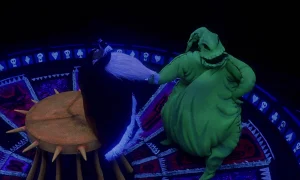 A screenwriter said she found Oogie Boogie’s name to be ‘troubling’ and asked Tim Burton for him to ‘reconsider’ the villain’s name. Credit: Walt Disney Pictures
A screenwriter said she found Oogie Boogie’s name to be ‘troubling’ and asked Tim Burton for him to ‘reconsider’ the villain’s name. Credit: Walt Disney Pictures
On the podcast, Thompson said: “Oogie Boogie is a derogatory term for African Americans in the American South. I begged the powers that be to change something about that character, because of that.
“I said: this is so ugly and dangerous and antithetical to everything inside me. I did not win that fight… It was a troubling part of the film for me, to be frank.”
She claims she begged Burton to ‘reconsider’ the character’s name, adding: “I think it’s a fun segment of the story as it was executed but it’s a troubling one.”
Selick previously stated the character was inspired by the Betty Boop cartoon The Old Man of the Mountain, elaborating to The Daily Beast that it ‘didn’t occur’ to him it could be seen as ‘racist.’
According to Bustle, the first time a Black actor was cast in a lead role in a Burton movie was in the 2016 film Miss Peregrine’s Home for Peculiar Children.
In the fantasy film, Hollywood star Samuel L. Jackson plays the role of the villain Barron.
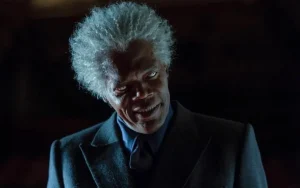 Samuel L. Jackson defended Tim Burton when questioned on the director’s work and its lack of diversity. Credit: 20th Century Studios
Samuel L. Jackson defended Tim Burton when questioned on the director’s work and its lack of diversity. Credit: 20th Century Studios
When asked about the lack of diversity in this particular movie, Jackson told Bustle: “I had to go back in my head and go, how many Black characters have been in Tim Burton movies? And I may have been the first, I don’t know, or the most prominent in that particular way, but it happens the way it happens.
“I don’t think it’s any fault of his or his method of storytelling, it’s just how it’s played out. Tim’s a really great guy.”
Again, Burton faced a backlash following the release of the hit Netflix series Wednesday – he directed some of the episodes.
Following the show’s release, people took to social media and questioned why its Black stars were portrayed as ‘bullies.’
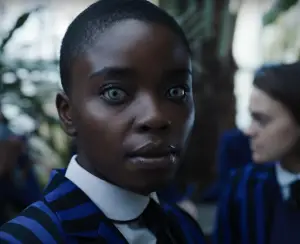
Tim Burton was also criticized for Wednesday’s representation of Black characters. Credit: Netflix
Bianca Barclay (played by Joy Sunday) is deemed a mean girl of the academy while Lucas Walker (Iman Marson) also plays a bully and the son of a corrupt mayor.
Referencing the characters on X, formerly Twitter, one fan said: “I’m loving the new Wednesday series, but why are all the Black actors lit so terribly?”
Another added: “Why are all the Black characters in Wednesday antagonists? Or did I miss something?”
Amid the backlash, some came to Burton’s defense, with one fan pointing out: “The Black girl was also classified as the prettiest most popular girl in the school. A Black girl with NON-Eurocentric features.”
Now, Burton’s work is once again facing scrutiny following the release of Beetlejuice Beetlejuice.
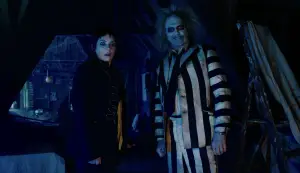
Tim Burton’s work is once again facing scrutiny following the release of Beetlejuice Beetlejuice. Credit: Warner Bros. Pictures
One particular scene of the sequel is being called out on TikTok, with viewers branding it ‘racist.’
“While I was watching the movie, my thoughts were ‘He finally hired a lot of Black actors but why only for this segment of the movie?’” one viewer questions.
Another adds: “During those scenes, I felt like it was weirdly disjointed and weirdly shoehorned into the story.”
A third TikToker comments: “I’m not Black but I felt like the scene was kind of racist.”
“When I watched it I said ‘Ohhhhh, okay,’” says someone else.
While a fifth person asks: “Isn’t this kind of racist, or is it just me?”
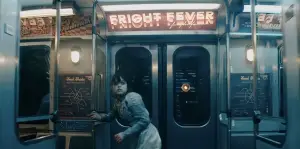
Some Beetlejuice Beetlejuice viewers were left unimpressed by the film’s ‘Soul Train’ sequence. Credit: Warner Bros. Studio
The Beetlejuice Beetlejuice scene in question follows Astrid Deetz (played by Jenna Ortega) as she’s doomed to the ‘Soul Train’ on the way to the Great Beyond – where you go where you’re dead dead.
While the ‘Soul Train’ scene may simply seem fun, it’s actually a nod to the musical variety TV show Soul Train, which debuted on a local Chicago network in 1970.
Throughout its history, the program featured performances by R&B, soul, and hip-hop artists, highlighting the joy of Black Americans through dance, style, and culture.
In a 2023 CNN explainer, Brooklyn White-Grier wrote: “In the middle of the Black Power era and feeding from the civil rights movement, Soul Train provided a fresh opportunity for Black people to see and celebrate themselves. It was the most prominent stage displaying the mingling of sociocultural and political progress – and an imagining of life unencumbered by white supremacy.”
Yet for some, taking into account Burton has frequently been called out for his lack of representation, this ‘Soul Train’ sequence has come across as disingenuous.
As one TikToker puts it: “This whole scene felt like Tim Burton saying ‘Here, damn!’”
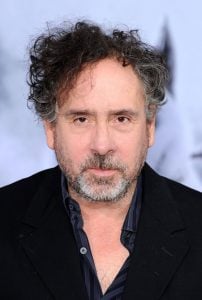 Tim Burton has been questioned about his films’ lack of diversity. Credit: Alamy
Tim Burton has been questioned about his films’ lack of diversity. Credit: Alamy
Amid the criticism regarding the ‘Soul Train’ scene, previous quotes from Burton have surfaced, in which he was asked why his work predominantly features white actors.
When questioned by Bustle on his works’ lack of diversity, the director responded: “Nowadays, people are talking about it more,” elaborating that ‘things either call for things, or they don’t.’
He continued: “I remember back when I was a child watching The Brady Bunch and they started to get all politically correct. Like, okay, let’s have an Asian child and a Black. I used to get more offended by that than just… I grew up watching blaxploitation movies, right? And I said that’s great. I didn’t go like, okay, there should be more white people in these movies.”
Amid the Beetlejuice Beetlejuice criticism, some viewers have leaped to Burton’s defense and praised the ‘Soul Train’ sequence, with one penning: “I actually felt a piece of amazing Black culture come from the ‘Soul Train’ scene.”
Agreeing, a second adds: “It’s literally an innocent scene, this is reaching. I thought this was one of the best scenes.”
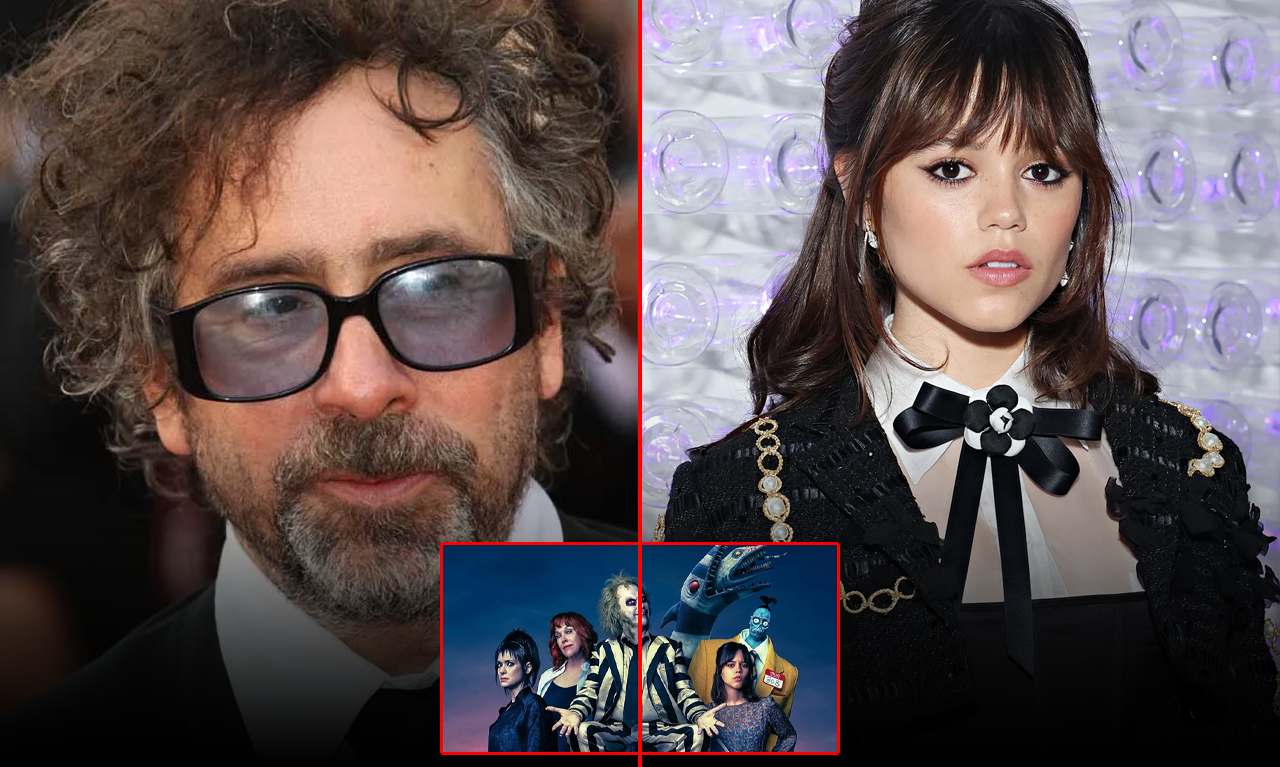
Leave a Reply